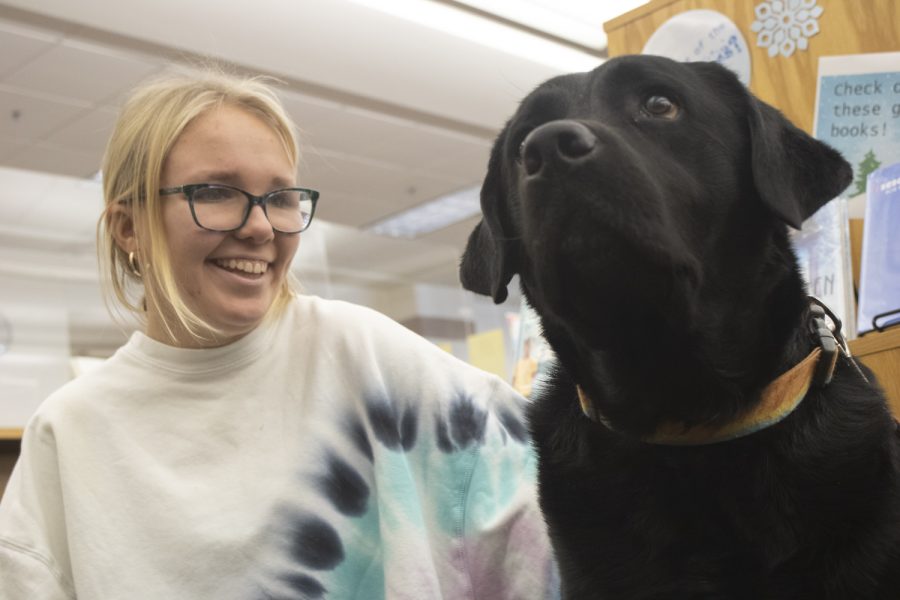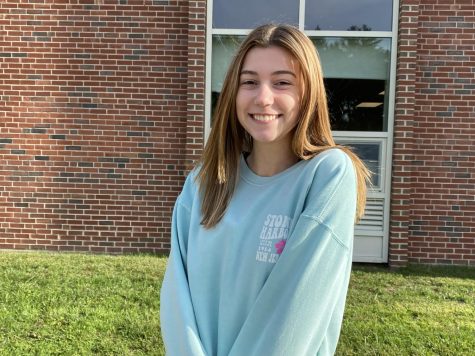More therapy dogs could make students’ ‘ruff’ days better
Junior Cali Tkachuk pets Parker, Algonquin’s therapy dog. Currently, the dogs of ten ARHS teachers are being trained to become certified therapy dogs.
January 12, 2023
The dogs of ten ARHS teachers are in the process of being trained to become certified therapy dogs. Should they receive such certification, they would join the current therapy dog, Parker, as a resource to help with student stress and bring more joy to the building.
Melican Middle School Principal Michelle Karb is a trainer for Bright Spot Therapy Dogs, Inc, as well as a member of the organization’s board of directors. Karb led a district-sponsored therapy dog training workshop on Nov. 8, providing interested teachers with an opportunity to begin the extensive process of certifying their dogs to be able to work with students.
Interested teachers must submit an online application to Bright Spot and, if approved, must complete the therapy dog training course. After completion, the dog is required to pass a certification assessment and pay the necessary fees.
“There has been a lot of research that shows that being in the presence of a dog can help calm people,” Karb said. “Some of the feel-good hormones like Oxytocin and Serotonin can really increase in the presence of a dog.”
In addition to helping students regulate stress and minimize anxiety, therapy dogs provide companionship and low-stress connections for students.
“Providing a non-judgmental living thing to support students and help them form connections with other kids is a real benefit,” Karb said.
Many schools throughout the district already have regularly attending therapy dogs, including Melican Middle School, Mary E. Finn School, Marguerite E. Peaslee School and ARHS.
“A dog is another tool that we can use to help people and provide them comfort,” Karb said.
Principal Sean Bevan sees the many benefits of therapy dogs as well; however, he takes into account the comfort and safety of all students as this big change approaches.
“We do want to be mindful that not every student is excited to interact with a dog,” Bevan said. “Not every student loves dogs. Some are fearful of dogs.”
According to a Harbinger survey of 160 students conducted through Google Forms from Dec. 12 to Dec. 15, 69% of respondents say they have personally benefited from having a service dog at Algonquin and 78% say they like the idea of having more service dogs in the building.
The logistics of having additional therapy dogs in the building have yet to be finalized. Bevan plans to communicate with families and create a schedule before new therapy dogs can be introduced into the building during third quarter.
“We need to go through this process really thoughtfully and with a great deal of transparency and communication with students and their parents,” Bevan said.
According to Bevan, if the program is popular among students, administration will allow the dogs to come into school more often, and any issues that arise will be addressed promptly.
“A lot of it will depend on how the third quarter goes,” Bevan said. “I think we will probably treat that as a pilot period.”
Karb believes the safety of the dogs during this process is equally as important as that of the students and faculty. Teachers must ensure that their dogs are being properly taken care of throughout the school day.
“The dog owners have to be really vigilant about the needs of their dog,” Karb said.
English teacher Sara Stein is one of the ten teachers who registered their dog(s) for the program. Stein has a Havanese named Pepper, who she believes is perfect for the program.
“Pepper has brought a lot of people joy,” Stein said. “She used to go visit my grandfather in the nursing home; she visits my parents who are aging. She’s good at it.”
Stein believes the possibility of more dogs at ARHS could benefit the community in many ways.
“I think that it is really positive that the district allowed for this professional development opportunity,” Stein said. “I think it does show a commitment to supporting students’ and staffs’ social emotional health, and I think that is something that we are going to be focused on for the years to come.”











